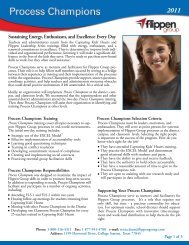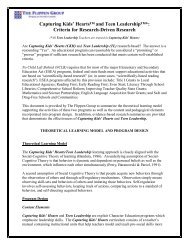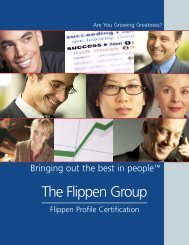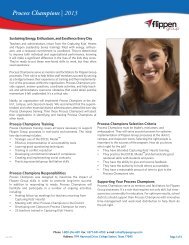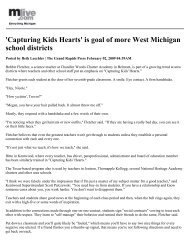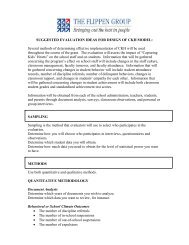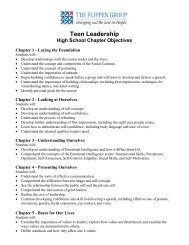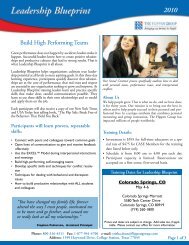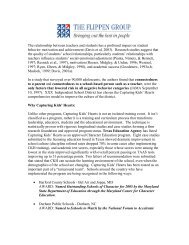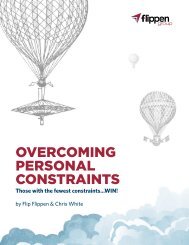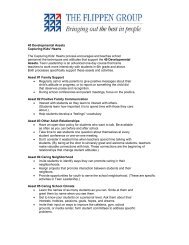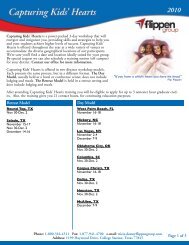Smart & Good High Schools - The Flippen Group
Smart & Good High Schools - The Flippen Group
Smart & Good High Schools - The Flippen Group
- No tags were found...
Create successful ePaper yourself
Turn your PDF publications into a flip-book with our unique Google optimized e-Paper software.
CHAPTER 4: <strong>The</strong> Professional Ethical Learning Communitydents. <strong>The</strong> box below describes, in abridged form, oneprotocol for examining student work.A CFG PROTOCOL FOR LOOKINGAT STUDENT WORK (www.nsrfharmony.org)Getting started: <strong>The</strong> CFG coach reminds the groupof the norms of no fault-finding, collaboration, andconsensus and, with the group, sets time limits foreach part of the process. <strong>The</strong> teacher providing thestudent work gives a very brief statement of theassignment but does not describe the student or evaluatethe quality of the presented piece of work. (2minutes)1. <strong>Group</strong> members describe what they see in the student’swork, avoiding interpretations or judgmentsabout quality. (10 minutes)2. Based on evidence, the group considers, how didthis student interpret the assignment? What doesthe student understand and not understand? Whatwas the student most interested in? (10 minutes)3. Based on the above discussions, the group considers:What next steps could the teacher take withthis student? What teaching strategies would bemost effective? (10 minutes)CFGs are a powerful practice, a structure that embodiesmany of the PELC Principles. <strong>The</strong>y can also become avehicle for increasing student voice. One high schoolprincipal in our study commented:We use CFGs to develop what Fred Newmann calls“authentic learning tasks” for kids. At least once in a givenunit, we’ll take a lesson we’ve developed together in a CFGand present it to students: “What do you think of this?What should this lesson look like?” In this way, they reallytake possession of the assignment.Make yourself the kind of person youwant other people to think you are.—SOCRATESCFGS: WHAT THE RESEARCH SHOWS<strong>The</strong> National School Reform Faculty reports thatteachers participating in Critical Friends <strong>Group</strong>s,compared to non-CFG teachers:◆ are more likely to feel that they are improvingevery year as a teacher.◆ are more likely to share ideas about teaching, sharesamples of their students’ work, meet regularly todiscuss classroom problems, and believe that theycould count on most of their colleagues to help outanywhere, anytime.◆ are more thoughtful about the connections amongcurriculum, assessment, and pedagogy.◆ have higher expectations for students. 35PELC 5: Practice collective responsibility forexcellence and ethics.Promising Practice 2:5.2 Promote peer mentoring.PELCPeer mentoring, typically done one-on-one,was another form of collective responsibilitywe observed in schools with a strong PELC. Said oneteacher:I’ve worked in six different schools. <strong>The</strong> difference here isthat people really care about and support each other. Anybodycan talk to anybody else and get help.“People here really supporteach other.”An experienced teacher will coach a new teacher, but itgoes the other way as well. As a new faculty member,you feel immediately appreciated because people find outwhat you’re good at and want to learn from you. Thisgoes on informally during school, after school, and inour summer professional development program. It’s rarethat we have someone come in from the outside to doan inservice because we have so much expertise amongour own faculty.79<strong>Smart</strong> & <strong>Good</strong> <strong>High</strong> <strong>Schools</strong>



